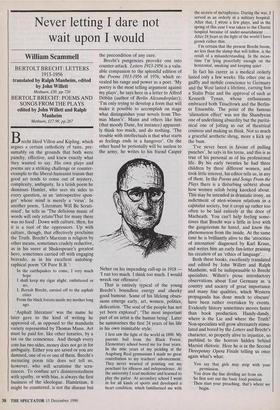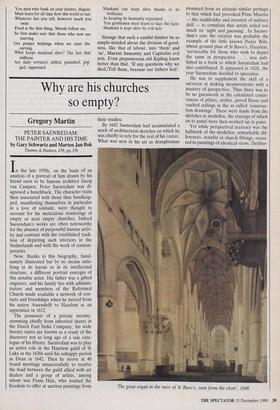Never letting I dare not wait upon I would
William Scammell
BERTOLT BRECHT: LETTERS 1913-1956 translated by Ralph Manheim, edited by John Willett
Methuen, .00, pp.720
BERTOLT BRECHT: POEMS AND SONGS FROM THE PLAYS edited by John Willett and Ralph Manheim
Methuen, £17.99, pp.267
Brecht liked Villon and Kipling, which argues a certain catholicity of taste, pre- sumably on the grounds that both were punchy, effective, and knew exactly what they wanted to say. His own plays and poems are a striking challenge or counter- example to the liberal-humanist truism that good art tends to come out of mystery, complexity, ambiguity. In a latish poem he dismisses Hamlet, who sees six sides to every question, as an 'introspective spon- ger' whose mind is merely a 'virus'. In another poem, 'Literature Will Be Scruti- nised', he tells us 'The delicious music of words will only relate/That for many there was no food'. Down with culture, then, for it is a tool of the oppressors. Up with culture, though, that effectively proclaims the Truth. Brecht's Marxism is religion by other means, sometimes crudely reductive, as in his sneer at Shakespeare's greatest hero, sometimes carried off with engaging bravado, as in his excellent autobiog- raphical poem 'Of Poor B.B.': In the earthquakes to come, I very much hope
I shall keep my cigar alight, embittered or no, I, Bertolt Brecht, carried off to the asphalt cities From the black forests inside my mother long ago.
'Asphalt literature' was the name he later gave to the kind of writing he approved of, as opposed to the mandarin variety represented by Thomas Mann. Art must be paid for, like other luxuries, by a tax on the conscience. And though every coin has two sides, money does not go in for ambiguity. Either you are saved or you are damned, one of us or one of them. Brecht's menacing poem title does not tell us, however, who will scrutinise the scru- tineers. To confuse art's disinterestedness with apathy, or with bias, is always the first business of the ideologue. Hamletism, it might be countered, is not the disease but the precondition of any cure.
Brecht's pungencies provoke one into counter-attack. Letters 1913-1956 is a valu- able companion to the splendid edition of the Poems 1913-1956 of 1976, which re- vealed his range and power as a poet. 'My poetry is the most telling argument against my plays', he says here in a letter to Alfred Dalin (author of Berlin Alexanderplatz); 'I'm only trying to develop a form that will make it possible to accomplish on stage what distinguishes your novels from Tho- mas Mann's'. Mann and others like him (that moody Dane, for instance) apparent- ly think too much, and do nothing. 'The trouble with intellectuals is that what starts as feelings ends in a hangover'. On the other hand he perSonally will be useless to the army, he writes to his friend Casper Neher on his impending call-up in 1918 — 'I run too much. I think too much. I would wreck our offensive'.
That is entirely typical of the young Brecht's boundless energy and cheeky good humour. Some of his lifelong obses- sions emerge early, art, women, politics, defecation. 'The soul of the people has not yet been explored'; 'The most important part of an artist is the human being'. Later he summarises the first 24 years of his life in his own inimitable style: I first saw the light of the world in 1898. My parents hail from the Black Forest. Elementary school bored me for four years. In the nine years of my pickling at the Augsburg Real gymnasium I made no great contribution to my teachers' advancement. They never wearied of pointing out my penchant for idleness and independence. At the university I read medicine and learned to play the guitar. At secondary school I went in for all kinds of sports and developed a heart condition, which familiarised me with the secrets of metaphysics. During the war, I served as an orderly iri a military hospital. After that, I,Wtote a few plays, and in the spring Of this year I was taken to the Charite hospital because of under-nourishment . . . After 24 yeali in the light of the world I have grown rather thin. I'm certain. that the present Brecht boom, no less than the slump that will follow, is the result of a misunderstanding. In the mean- time Fni lying peacefully enough on the horizontal, smoking and keeping quiet. . .
In fact his career as a medical orderly lasted only a few weeks. His other one as gadfly and ro'obile conscience to Germany and the West lasted a lifetime, earning him a Stalin Prize and the approval of such as Kenneth Tynan, whose enthusiasms embraced both Tinseltowit and the Berlin- er Ensemble. The point of the famous 'alienation effect' was not the Shandyean one of underlining absurdity but the purita- nical one of jolting us out of theatrical cosiness and making us think. Not so much a graceful aesthetic shrug, more a kick up the bum.
'I've never been in favour of pulling punches', he says in his teens, and this is as true of his personal as of his professional life. By his early twenties he had three children by three different women, and took little interest, his editor tells us, in any of them. In the Poems and Songs From the Plays there is a disturbing subtext about how women relish being knocked about. This May be intended as draMatic irony, an indicttherit of nieti-wbmen relations in a capitalist society, but it crop's up rather too often to be laid entirely at the door of Macheath. You can't help feeling some- times that Brecht was a little in love with the gangsterism he hated, and knew the phenomenon from the inside. At the same time he is brilliantly alive to the 'atrocities of intonation' diagnosed by Karl Kraus, and writes him an early fan-letter praising his creation of an 'ethics of language'.
Both these books, excellently translated and edited by John Willett and Ralph Manheim, will be indispensable to Brecht specialists. Willett's pious introductory observations about East Germany as 'a country and society of great importance and many fine qualities, which Western propaganda has done much to obscure' have been rather overtaken by events. Evidently history sometimes moves faster than book production. Handy-dandy, where is the Lie and where the Truth? Non-specialists will grow alternately stimu- lated and bored by the Letters and Brecht's character, so properly alive to injustice, so purblind, to the horrors hidden behind Marxist rhetoric. Here he is in the Second Threepenny Opera Finale telling us once again what's what:
You say that girls may strip with your permission.
You draw the line dividing art from sin. So first sort out the basic food position Then start your preaching, that's where we begin. You men who bank on your desires, disgust, Must learn for all time how this world is run: Whatever lies you tell, however much you twist Food is the first thing. Morals follow on. So first make sure that those who now are starving Get proper helpings when we start the carving.
What keeps mankind alive? The fact that millions Are daily tortured, stifled, punished, gag- ged, oppressed. Mankind can keep alive thanks to its brilliance In keeping its humanity repressed.
You gentlemen must learn to face the facts: Mankind is kept alive by evil acts.
Strange that such a candid thinker be so simple-minded about the division of good- ness, like that of labour, into 'them' and 'us', Marxist humanity and Capitalist evil acts. Even preposterous old Kipling knew better than that. 'If any questions why we died,/Tell them, because our fathers lied'.



























































 Previous page
Previous page